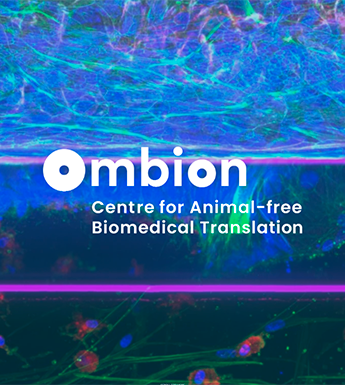
Did you know?

FC3R is participating in the International Education Hub, a project launched in the Netherlands that brings together 17 countries to share educational resources promoting the teaching of life sciences without the use of animals. This initiative is supported by the Ombion Center for Animal-Free Biomedical Research.
Towards science without the use of animals
July 7, 2025 marked an important date for animal-free research in the Netherlands. On that day, the " Ombion Centre for Animal-free Biomedical Translation ," formerly the CPBT, dedicated to scientific innovations that do not use animal experimentation, was officially inaugurated in Utrecht. With an allocated budget of €245 million for the period 2025-2034, this funding was provided by the Dutch National Growth Fund (€124.5 million) and more than 60 national and international partners. The CPBT represents the operational pillar of a proactive policy: the Transition to Animal-Free Research (TPI) program. The CPBT's initial research projects will focus on amyotrophic lateral sclerosis (ALS), cystic fibrosis, osteoarthritis, asthma, and chronic obstructive pulmonary disease (COPD).
The TPI program: strategy and objectives
The TPI program, launched in 2018 as a collaboration between the Dutch government and stakeholders from the scientific, industrial, and non-profit sectors, aims to accelerate the transition to biomedical research practices that do not involve animal testing. It embodies an ambitious vision: "better prediction of human physiology without laboratory animals" by promoting more effective and ethical alternative methods.
The TPI program is managed by an office attached to the Dutch Ministry of Agriculture, Fisheries, Food Safety, and Nature (LVVN). It is based on collaborative governance, embodied by two structuring groups:
-
A transition group, responsible for steering the main strategic priorities;
-
A core group, composed of high-level representatives of the partners (ministries, research institutes, NGOs, etc.).
These bodies are tasked with developing a shared roadmap, setting short-, medium-, and long-term objectives, and overseeing their implementation.
To make this transition a reality, the TPI has identified six major strategic objectives to be achieved by 2029:
1. Develop existing innovations and create new ones
The Netherlands is focusing on cutting-edge technologies to replace animal testing, such as:
-
Organs on chips.
-
Human organoids grown in the laboratory.
-
Artificial intelligence modeling.
-
3D cell cultures.
The aim is to promote their development, validation, and implementation in both public and private laboratories.
2. Facilitating the recognition of alternative methods
TPI is committed to simplifying regulatory validation processes and promoting their acceptance by health agencies, researchers, and the pharmaceutical industry.
3. Supporting researchers in making ethical choices
The program encourages training, methodological support, and funding for research aimed at the gradual phasing out of animal testing. Initiatives such as Helpathons, collective brainstorming sessions to design innovative solutions, and start-up competitions such as the Proefdiervrij Venture Challenge illustrate this desire for direct involvement by researchers.
4. Involving all stakeholders in society
TPI brings together a whole ecosystem: researchers, start-ups, students, public decision-makers, associations, and citizens. Through networks of young future researchers such as Young TPI and exchange platforms such as TPI.tv, it creates a shared culture of ethical innovation.
5. Sharing knowledge openly
TPI advocates open science, where data on animal and non-animal testing is easily accessible, traceable, and reusable (FAIR).
6. Adapting to the European regulatory framework
Although regulatory decisions are largely taken at European level, TPI is actively working to influence European policies and explore national leeway to eliminate certain unnecessary tests, particularly in the chemicals sector.
The transition also involves Europe
The transition to science without animal testing cannot be achieved in isolation. That is why the TPI program is developing a European influence strategy aimed at:
-
Harmonize Member States' policies in favor of animal-free innovation;
-
Strengthen cross-border scientific collaboration;
-
Influencing the European Commission's roadmaps, particularly on chemical safety testing.
Through the implementation of the TPI program and the launch of the Ombion Center, the Netherlands is demonstrating that a transition to animal-free research is possible thanks to an ambitious, collaborative, and sustainable strategy.
